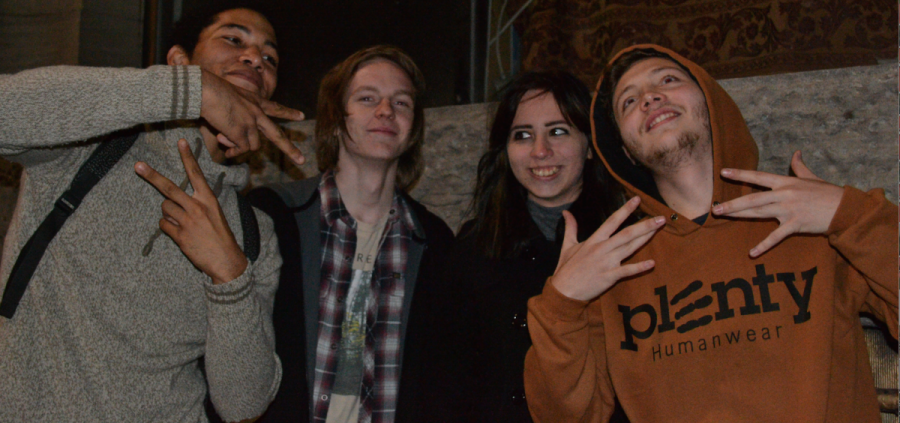Jukebox Ocean Are Hard to Describe
Local Montreal Prog-Jazz-Noise Quartet Are Confusing and Awesome
We’re standing beside one of those really excellent St. Laurent Blvd. Portuguese chicken joints. It’s cold. It’s late. We’re having fun. We’re doing an interview.
Jukebox Ocean and I are huddled in an underdressed circle. By the entrance to Club Lambi, the venue the local quartet just played, a crowd of cigarette-smoking teens glances at us. Ignoring them, Jukebox Ocean argues, because the band can’t decide what genre they are.
Joseph Anidjar—lead guitarist, lead songwriter—spells it out: “It’s Jazz. With a silent ‘D.’”
“Like Djent,” says Shayne Assouline—drummer and most-talkative member. “Djazz.”
“It’s kinda math rocky, Progressive.” Anidjar says. “It’s definitely Progressive.”
“It’s not prog rock, though.” That’s Chloé Edwards. Bassist, week-old addition to the band. “We’re not Yes.”
“No,” says Assouline.
“Yeah,” says Anidjar. “It’s prog math-rock.”
“It’s prog math-rock,” agrees Assouline.
Iann Duthie, who plays supporting guitar, stays silent.
“It’s Progressive math jazz,” says Anidjar. Then they stop arguing.
It’s settled, then. Except later they’ll say that genre doesn’t matter, making their argument irrelevant. Then after that they’ll say, unequivocally, that they are prog-metal.
Why does it matter? I don’t know, and Jukebox Ocean is confusing. Their music is a weird hybrid of, well, lots of things. At the show, Oct. 3—a Facebook event accurately titled “Jukebox Ocean+The OM Sound+Piranhas Can Fly” and featuring those three bands—Jukebox Ocean plays first. Club Lambi, the venue, is like the white bread of venues. It’s as nondescript as possible—largely rectangular, black, there’s a mirrored wall, has tables but also floor near the stage, has a stage, musicians play on the stage, etc. Quite unlike Jukebox Ocean.
Anyways, the three 18 year-olds and one 17-year old (guess who’s who!) throw all of those genres and their panoply of influences into frenetic compositions that ebb and flow in and out of recognizable structures. The songs are written by Anidjar and Assouline, both jazz students at Vanier College (as are the other two), and heavily bear the mark of a virtuoso’s indulgence.
Take their set’s first song, “Yep.” It’s actually an interlude, but whatever. Tonally, it’s all over the place. Not in a bad way, mind; it’s never not mellifluous, but it’s hard to follow. There’s a lot going on. Post-core cymbal smashing. Finger-tapping guitar leads. Jazz. Djazz. If the crew were lesser musicians, I’m sure it would be a mess. But it’s so short that it’s hard to get into. Anidjar abhors repetition, he once said.
Then they introduce themselves and play “Nope,” which starts with a dystopian funk line interjected with drum solos. It turns into what a James Bond theme from the Watchmen universe would sound like, all brood and intrigue. But, again, the vibe is hurt by the brevity and over-variety.
Like, it’s compelling stuff. It’s good. It’s cool. It’s fun. But it feels unfocused. That gets obvious when they cover two songs by Chon—a band they cite as a heavy influence. Chon’s songs are short, yes, but direct. There’s variation, but it feels like it serves a clearer thematic purpose than Jukebox’s does. I get it, it’s like my overuse of sentence fragments. I’ve seen it done well, and want to learn how. Feeling the intent. Their full song, “Blue Line,” feels more fleshed out, though, so I know they can do it. I don’t know why they didn’t.
Because Jukebox Ocean’s sound is so amalgamous, it needs qualification. And while I thought they had a Concordia connection, they don’t. For both of those reasons, I ask them why people should give a fuck about their band.
“Because… because… shit,” Anidjar says. “Yo, help me out.”
Duthie, the quiet one, says, “Because we give a fuck about music.”
Assouline, “Because we give so many fucks about music.”
Anidjar, gesturing at the cigarette kids, “Because we give a fuck about them.”
I disagree. I think people should give a fuck about Jukebox Ocean because they take the whitest, most sterile (tell me Post-Core isn’t over-produced), most suburban genres in the world and enrich them with the tapestry of Black protest music. Jazz, funk and hip hop shine through from Assouline’s drumming heritage. Progressive Rock and Post-Core flange off Anidjar’s guitar and, uh, heritage. Their interplay echoes those who got good because they had too much time in the ‘burbs and those who got good to get out of the hood.
It’s almost de-appropriation. This is a conscious act, steeped in the history of music, to try and advance a genre by recombining it with its roots—by combining Chon with The Roots.
“Music evolves from mixing cultures,” Assouline says. “Genres change every 50 years because people are like ‘Fuck what the old guys did, let’s do what they did AND NEW THINGS.’”
He’s right. And that’s what Jukebox Ocean is doing. They’ve got potential, and a unique perspective. They’re doing cool stuff. Their album comes out Nov. 27, check it out.




2_600_375_90_s_c1.jpg)
_600_375_90_s_c1.jpg)

